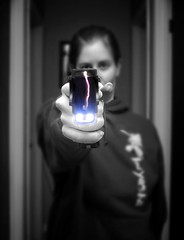
Marijuana may not seem like a big deal nowadays. With California, and then Colorado, legalizing it for medicinal purposes, the stigma once associated with marijuana use has faded away to a certain extent. If you are charged with a marijuana crime in Utah, though, that stigma is still there. Marijuana charges in Utah are some of the toughest (if not THE toughest) in the nation. A testable amount of marijuana in a baggie is punishable by up to six months in jail, thousands of dollars in fines, and a six month suspension of your driver license.
If facing Marijuana charges in Utah, here's a few things to keep in mind:
1. The severity of your charge, and hence the potential sentence, is based on weight
Busted with an ounce of weed or less? Class B misdemeanor (unless you have prior convictions for marijuana or other narcotic use). Busted with a few bricks? Possible 1st degree felony and punishable by life in prison. That's right, that's not a typo: you could get life in prison just for possessing marijuana. Utah law states that possessing above a certain amount of marijuana leads to the reasonable conclusion that you meant to distribute it. Basically, the government thinks anyone with a lot of marijuana is going to sell it and charges you accordingly. The container is also weighed so if you packed the marijuana in heavy plastic or metal, better hire a good drug crimes attorney quickly.
2. Drug free zones enhance the charges
Where are the drug free zones? Almost everywhere. In Salt Lake County you can't go more than a block without being in a drug free zone. Schools, gyms, community centers, nonprofits, shopping malls, playgrounds, the list goes on and on. If you are stopped near any of these your misdemeanor marijuana charges just might have become felonies. Unfortuantely, some police officers use these to their advantage and will follow you until you are in a drug free zone before pulling you over just to get the enhancement.
3. The Driver License Division hates you
There is hardly a more frustration organization to work with than the DMV/DLD. They want, seemingly very badly, to suspend your driver license if you have a marijuana charge. There are deals that can be worked out such as diversions and pleas in abeyance that do not count as a conviction, which is what the DLD needs in order to suspend your license. A growing trend in Utah marijuana cases has been the DLD suspending licenses even though they don't have a conviction. Several times, I've had to get a court order and take it down to the Driver License Division to get my client's driver license back because the DLD unlawfully suspended it. It is a pain, they suspend it for long periods of time, and they occasionally due it unlawfully. A good Utah marijuana attorney is worth the money just so you don't have to be the one to deal with your driver license issues.
4. Prosecutors like to look tough on crime by being harsh on drug cases
Sadly, getting convictions with long jail/prison sentences is an easy way for a fresh young prosecutor to make his mark at his office. Big drug busts and the ensuing court proceedings often make it into newspapers and the prosecutors are even less likely to make a deal. Marijuana is an easy target because many city governments and counties in Utah want to seem like they are fighting the growing trend of marijuana becoming acceptable in society. This makes it much more difficult to work out good deals on marijuana cases.
5. Judges seem tough on crime by giving long sentences on drug cases
This is even worse than prosecutors going extra hard on marijuana cases. Judges now know that long sentences make the papers and put them in a good light with the powers that be and the general public. "Judge sentences drug dealer to life in prison," is a headline most judges crave. Even on things such as magic mushrooms and marijuana. It's a growing trend that, sadly, is filling our jails and prisons with mild marijuana users rather than the hardened violent criminals that should be there.
6. Bottom line
The bottom line is everyone in government is looking to be harsher and harsher on marijuana users in Utah. Don't let them push you around and talk you into pleading guilty! Eventually, at least in this attorney's humble opinion, marijuana will be legal everywhere, even Utah. Until then, if you are busted, call an experienced drug crimes attorney today and fight it.














